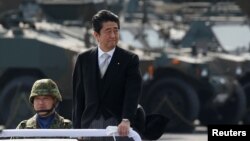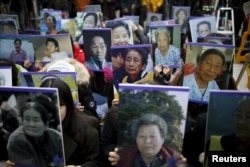Next week, Japanese Prime Minister Shinzo Abe is expected to engage in a now familiar diplomatic offensive to reconcile lingering resentment over his country’s wartime past when he visits the Pearl Harbor memorial in Hawaii. Japan’s surprise attack on the U.S. naval base in 1941 killed over 2,000 Americans and drew the United States into World War II.
After alienating regional neighbors in 2013 by visiting the Yasukuni war shrine that honors millions of war dead, but also includes the names of over a thousand convicted war criminals, the conservative Japanese leader has taken a very proactive role to address concerns over his efforts to recast wartime history with a less apologetic tone, and to ease the limits of Japan's pacifist constitution.
“He’s done a good job in the last two years or so of really, I would say, keeping his mouth shut and not expressing his, what are probably his deeply held, views about recent regional history, particularly involving World War II. And that’s what statesmen do,” said Grant Newsham, a senior research fellow at the Japan Forum for Strategic Studies in Tokyo.
Revisionist
Abe is a perceived nationalist who embraces a revisionist view of history that portrays Japan not as the imperialistic aggressor in World War II, but as a nation that tried to push back against U.S. and European domination of Asia.
“The counter narrative, one of revisionists, the one that is led by Abe, is that that is one sided and biased, and that Japan is the victim of victors’ justice and victors’ history, that unfairly impugns Japan and tarnishes its reputation,” said Jeff Kingston, the director of Asian Studies at Temple University in Tokyo, during a recent seminar at the school.
Comfort women
Comments by Abe and his supporters that downplay or omit wartime atrocities committed by Japan have enraged China, where an estimated 20 million Chinese died fighting the Japanese in the 1930s and 1940s, and South Korea, which Japan ruled as a colony from 1910 to 1945.
Regarding the estimated 200,000 Asian “comfort women” forced into sexual slavery by Japan’s military during its occupation of Asia and during World War II, the Japanese leader has used elusive language to express remorse without assuming responsibility for past abuse.
Some Abe supporters caused widespread outrage in Asia with claims that many “comfort women” were not coerced but willingly engaged in prostitution for financial gain.
South Korean President Park Geun-hye had refused to hold any bilateral meetings with Prime Minister Abe until he offered proper atonement and reparations.
With Washington also pressuring Abe to resolve this contentious issue, Tokyo and Seoul negotiated for months on a settlement that would satisfy South Korea but also mitigate disapproval from Japanese nationalists.
The two sides reached a deal in December of last year. Abe released a written statement that offered his “most sincere apologies and remorse to all the women who underwent immeasurable and painful experiences and suffered incurable physical and psychological wounds.” Tokyo also agreed to contribute over $8 million to a South Korean fund to aid the surviving “comfort women.”
South Korea in return resumed bilateral cooperation and both sides agreed the settlement was “final and irreversible.”
Russia
The Japanese prime minister had less success negotiating with Russia to give back the southern Kuril islands in the western Pacific, that were seized by Soviet forces at the end of the war, forcing about 17,000 Japanese residents to flee.
The two countries have been unable to agree on a post war peace treaty because of the ongoing dispute over ownership of the islands.
Last week Abe and Putin met for two days of talks and agreed in the end only to increase economic cooperation with the hope to reach some agreement on the island chain in the future.
China
Japan’s close relationship with the United States and Abe’s efforts to expand the scope of the military has raised concerns in China.
Beijing and Tokyo are involved in a territorial dispute over a group of uninhabited islands called the Senkakus in Japan and Diaoyu in China in the East China Sea.
There have been numerous close encounters between the two countries’ naval forces and coast guards in the disputed zone.
In September, Prime Minister Abe met with Chinese President Xi Jinping at the G20 summit in China, where both agreed to increase dialogue to resolve this issue and to establish a hotline to prevent accidental collisions between the two countries’ militaries.
Trump
Abe’s visit to Pearl Harbor is in part a reciprocal gesture for President Barack Obama’s visit to Hiroshima in May. The first sitting U.S. president to visit the site of the initial U.S. atomic bomb attack in 1945, Obama offered sympathy for the victims, but no apology.
Abe had fostered close ties with Obama in supporting the Trans Pacific Pact (TPP) free trade agreement, and to expand its military role to counter the North Korean nuclear threat and China’s aggressive moves in the South China Sea.
But the recent presidential election victory of Donald Trump may have added new urgency for Abe to show solidarity with the United States. Trump has opposed TPP and during the campaign he criticized Tokyo for not paying its fair share of mutual defense costs for the 50,000 American troops stationed in Japan.
Youmi Kim in Seoul contributed to this report.













